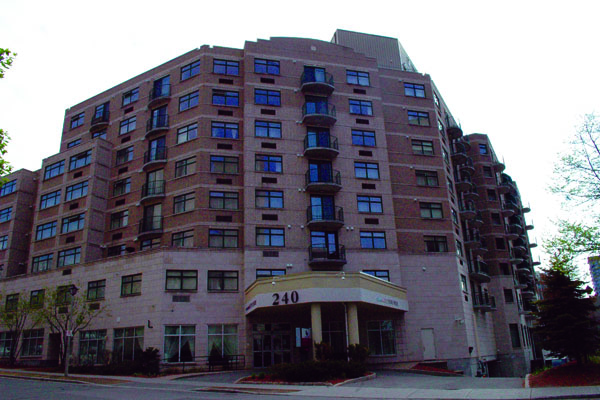When Dakota Cherry signed a lease to rent her new student house for the 2017-18 school year, she wasn’t expecting paradise, but at the very least a decent place to call a home away from home.
But when Cherry, now a third-year public administration and political science student at the U of O, and her roommates opened the door to the property in Ottawa’s Sandy Hill, they immediately noticed something was seriously wrong.
“It started raining, and water started pouring in from the ceiling … it was like Niagara Falls in our fucking living room.”
Per texts and emails shared with the Fulcrum, Cherry immediately told her landlord about what they determined to be a roofing issue, but he insisted it was a leaky water pipe.
The next day, things took a turn for the worst.
Cherry said she and her roommate woke up from a deep sleep of close to 24-hours, and began feeling extremely sick. Their symptoms included extreme fatigue, lethargy, dizziness and painful headaches, the telltale symptoms of mold exposure, according to an article published in the journal Toxins in 2013.
“We had slept for an entire day; it was absolutely insane.”
Cherry and her roommate began to inspect the house more closely and found large patches of mold in the basement and inside the walls. When she told her landlord about the mold, he offered to redo the walls but not fix the leaking roof, the root of the problem, she said.
They decided to withhold rent until the problems were properly dealt with, but were hit with an eviction notice and a hydro shut off on May 2. In response, she called an inspector from the City and told her landlord.
Later that day, Cherry said an unidentified man came to their door “to turn back on the hydro,” but she didn’t think to ask for identification. She watched him go down to the basement and moments later began hearing loud banging noises and went down to investigate.
“This man has a huge sledgehammer and was trying to take (mold) off the ceiling, putting it into a plastic bag to dispose of the evidence,” she said.
Cherry and her roommate fled from the house and filed a police report, deciding it was time to leave the house for good—but not without the first and last month’s rent they’d already paid to their landlord.
They applied to have their case heard at the Landlord and Tenant Board and about two months later, their date finally arrived.
“I couldn’t sleep the night before … I thought it would be me in my cheap Reitmans pant suit against some top Ottawa lawyer,” Cherry recalled.
When she arrived to the board with all her landlord’s correspondences, the rental lease, photographic evidence collected from the property and even written statements from previous renters, her landlord quickly gave in.
He agreed to pay back last month’s rent and half of the first month to each renter, over $4,000 in total.
“We jumped for joy,” Cherry said. “It was the best feeling in the world.”
Students vulnerable to being taken advantage of by landlords
While Cherry’s story is certainly dramatic, it isn’t uncommon.
When asked if students are an especially vulnerable population when it comes to abuse and exploitation by landlords, Karen Andrews, a lawyer with the Toronto-based Advocacy Centre for Tenants of Ontario, responded almost instantly.
“Absolutely, without a doubt. In the landlord business, it’s all about taking as much money from the tenant as you can get away with and putting as little money into the property as possible.”
Renters aged 15 to 24 composed almost 10 per cent of all renters in Ontario in 2011, while renters aged 25 to 34 made up over 20 per cent of this number (the highest of any age group), according to a report released by the Federation of Rental-housing Providers of Ontario. These cohorts encompass the average age of post-secondary students in Canada as of the 2015-2016 academic year per Statistics Canada.
“Students have money pressures, they have school pressures, they’re away from home (for the first time),” she said. “They’re not really positioned to be very good consumers about their housing situations, nor do they have a lot of choice about their housing situation. I think landlords are only too ready to take advantage of this population.”
The common problems Andrews sees in her work range from badly maintained properties and an unwillingness to complete repairs in a timely manner to pest and privacy issues.
Another common issue for student tenants is the type of landlord that commonly rents to them, she said.
“They’re typically mom and pop operations,” Andrews said. “These landlords often don’t know the rules and sometimes they don’t play by the rules.”
Andrews points out international student renters may have it even worse than students from Canada.
“Their access and ability to do research is limited,” she said. “If you’re from Hamilton and you’re going to school in Ottawa you can come to the city for a weekend and check out places, but if you’re coming from China you can be lied to via the Internet.”
But if you are in a bad situation, Pascale Ouellette, a tenant lawyer with the University of Ottawa Community Legal Clinic, said there are many resources available.
Preventing issues from coming up in the first place is an important part of the rental process, Ouellette said in an email to the Fulcrum.
“It is always a good idea to view a place in advance before agreeing to rent it,” and “to do a quick online search to see if you can find any reviews about the unit you are interested in or the landlord in question,” she said.
Getting comfortable and familiar with municipal and provincial landlord and tenant law is key, as well as conducting basic consumer research on the renting situation in the desired area, Ouellette said.
Most post-secondary campuses offer community legal clinics to help students maneuver through the intricacies of landlord and tenant law. From there, a City inspector or bylaw officer is a good next step (with legal advice) and, if need be, the Landlord and Tenant Board.
Student renters not the easiest of tenants
But, on the flipside, there’s no denying that some students can be difficult renters for landlords.
John Dickie, an Ottawa lawyer specializing in residential, landlord and tenant law, said the most common issue with student renters is partying.
“Most students are living away from home for the first time and they have to learn to balance their new freedom and their new responsibilities (as renters),” Dickie said. “Student renters can also be experimenting with a greater use of alcohol and partying” and “as young people, they may also enjoy staying up later at night.”
The Rideau-Vanier ward of the city for example, home to Sandy Hill, the ByWard Market and Lowertown neighbourhoods, U of O’s primary off-campus location for student housing, is notorious for its high volume of noise complaints.
According to statistics on service requests to the city, obtained through Open Data Ottawa, during the month of July 2018 the Rideau-Vanier ward had the most music-based noise complaints by far.
The ward clocked in at 79 complaints, followed by the Somerset ward (home to the Centretown neighbourhood) at 53 and the Capital ward (home to the Glebe, Old Ottawa East and South, Heron Park and Riverside neighbourhoods) at 39. Both the Somerset and Capital wards are popular neighbourhoods for students as well.
Another common issue local landlords have with student renters is improper waste disposal, Dickie said. Students are the usual culprits for putting garbage and recycling out on the wrong day or simply not disposing of it at all.
“If the garbage goes out too late … it could wait for weeks,” Dickie said, referring to the City’s garbage collection schedule, which takes place twice a month. “If it goes out too early it’s unsightly for an unnecessary period of time and animals can get in it.”
Of the close to 450 service requests associated with exterior debris and waste submitted to the City through July 2018, almost 100 came from the Rideau-Vanier ward alone.
Service request statistics to the City also shine a light on problem areas for possible landlord issues for student renters as well.
When it comes to property standards service requests for both exterior and interior damage, often used to get an unwilling landlord to comply with a necessary repair to a rental property, the Rideau-Vanier ward ranked highest.
For the month of July 2018, the ward totalled 55 service requests, followed closely behind by the Somerset ward with 52.
Charlotte MacIntyre, a fourth-year international development student at U of O, was forced to file one of these requests around May of this year due to issues with her rental property near Charlotte Street in upper Sandy Hill that took a year to fix.
Since first moving into the property in May of 2017, MacIntyre said she dealt with a heavy leak in her bedroom that the landlord would patch every once and awhile but never fully repair.
“I had to tear up garbage bags to cover all my stuff and push everything to one side because dirty water was leaking through the ceiling,” she said.
When winter came around the leak stopped (she realizes now, likely due to freezing,) so she re-signed the lease. But when spring hit the leak came back in full force, spreading to the hallway and another roommate’s bedroom.
“I couldn’t be in my room, so for the month of April pretty much I was staying at a friend’s house,” she said.
With her landlord not replying to texts or emails, MacIntyre turned to the City for help.
The bylaw officer who came to inspect the property “was absolutely shocked,” she said.
“Bylaw issued a work order and they had the entire roof replaced, it wasn’t just a fix,” MacIntyre added. “It took getting the City involved from (my landlord) to actually take us seriously.”
For the most part though, Dickie said the vast majority of student renters and their landlords respect their corresponding rights and duties, despite a few bad apples on both sides of the property line.
Your new front door ahead
While it is clear that resources do exist for students facing issues with their rental property or landlord, those who shared their negative rental experiences with the Fulcrum noted major barriers exist to seeking legal remedy.
One of these is financial—even applying to have a case heard in front of the Landlord Tenant Board carries a $50 charge, or $45 if the application is completed online. If the case does make it to the board, hiring a lawyer or paralegal to represent you could carry a hefty price tag.
But the real commitment is time, Andrews said. Getting a court date usually takes two to three months, and getting a landlord to comply with a decision can stretch this process out even further.
“Enforcement is definitely an issue,” she said.
Andrews said that going forward, post-secondary institutions need to play a bigger role in student housing outside of residence, investing in off-campus housing and renting to students to ensure the process is fair and just.
“Universities (and colleges) have to be more alert to this issue and they need to take more responsibility helping their students find appropriate housing,” she said. “It’s really affecting the quality of the experience that students have.”
The U of O’s legal clinic provides services to students free of charge. Students can access the clinic by visiting 17 Copernicus St. on Mondays or Wednesdays from 7–9 p.m. or Thursdays from 2–4 p.m.
This article has been updated to correct the spelling of Pascale Ouellette’s last name and to clarify her statements.





